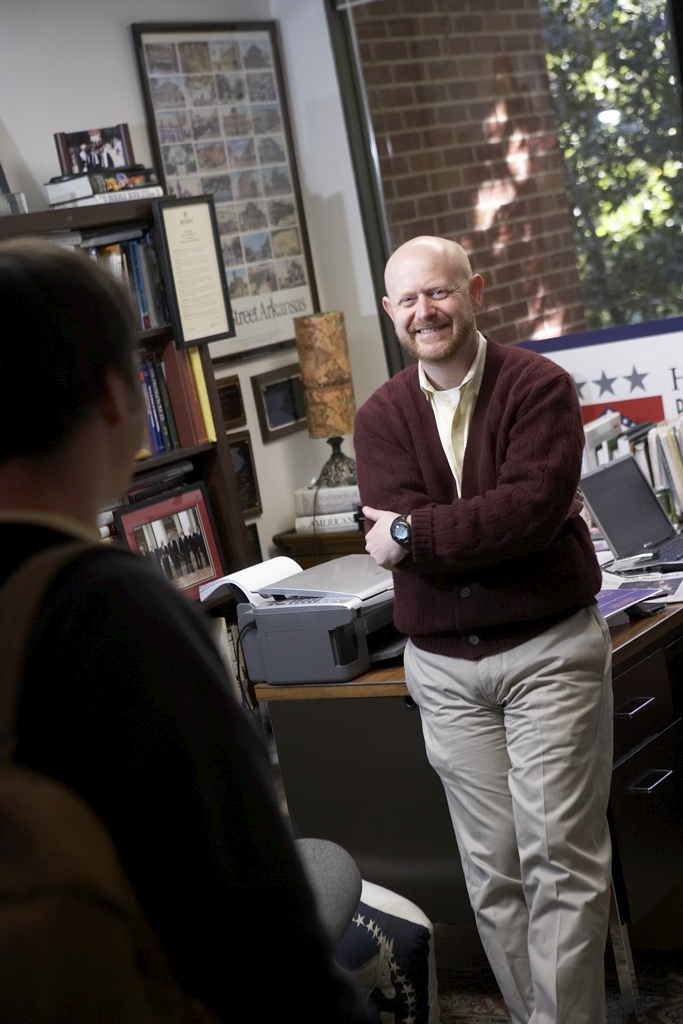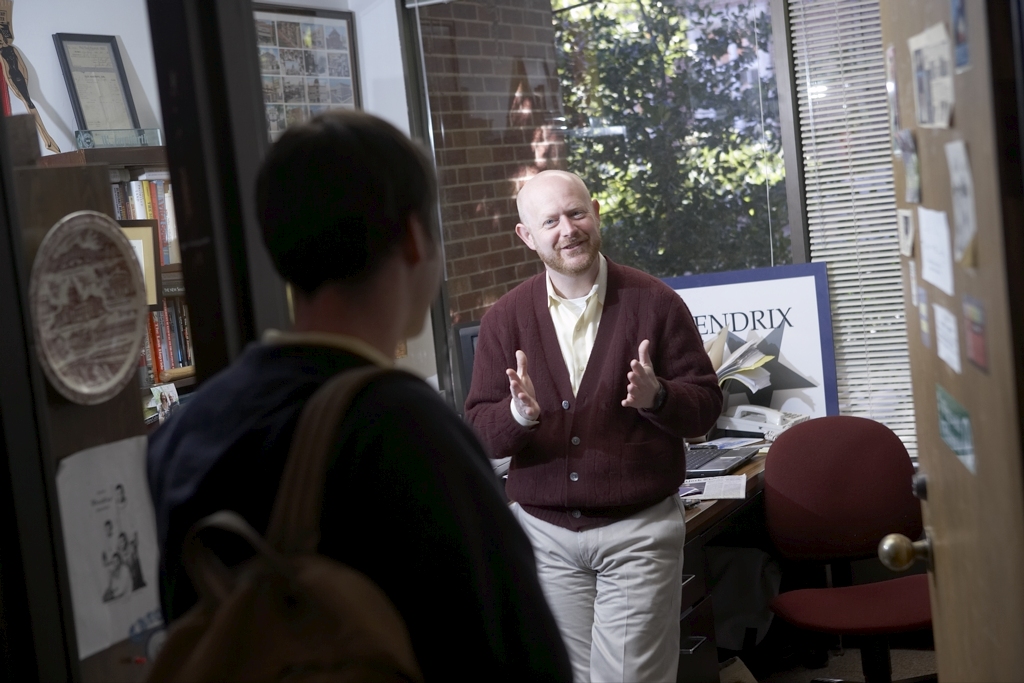Inspiration in Iowa
Trip to caucuses motivates Hendrix’s politics expert
By MARK SCOTT
Director of Media Relations
On the night of Iowa’s Democratic presidential caucuses, Hendrix College professor Jay Barth personally witnessed the intriguing electoral procedure at a small precinct called “Des Moines 9.” As delegates were being counted, the final holdout that night was an older African-American woman who initially supported Christopher Dodd but found herself undecided during a subsequent round of balloting. 
The room was separated with Clinton supporters in one area, Obama supporters in another and Edwards supporters in another. As she stood up to walk to where she would caucus, the 60 Obama supporters started chanting, “O-bam-a! O-bam-a!” They all clapped excitedly as she joined them – and ultimately thousands of others who awarded the state to the future president.
“In some ways, this little precinct summed it all up: the enthusiastic support for Obama from a Bobby Kennedyesque coalition of voters, the homogeneity and passivity of the Clinton supporters, and the interest in the process of rank-and-file voters that led 236,000 of them to turn out,” Barth wrote at that time on the Arkansas Times blog where he posted regularly throughout his time in Iowa.
In Iowa a year ago Barth witnessed the emergence of thousands of “new” voters – people who had never voted before but were motivated by Obama to do so. It was also in Iowa that Barth was introduced to the future president and his connection with voters, an observation that only grew stronger for him throughout the historic presidential election.
“It was one of the most rewarding things I’ve ever done,” Barth said of his Iowa experience, lofty words for a man whose political experiences are vast. “There was a deep understanding or desire for change in the electorate there. Barack Obama had emphatic support that was very visible in Iowa. I came away from there seeing his strength as a candidate and the amazing connection he had with the voters there.”
Barth acknowledges that Obama won his vote there in Iowa. He remained officially neutral, however, due to his leadership position on the Pulaski County Democratic Committee.
For Barth, the M.E. and Ima Graves Peace Distinguished Professor of Politics at Hendrix, such neutrality comes easily, however. While political scientists can fall into one of two extremes, he explains – either detaching from real politics and losing insight or completely engaging in partisan politics and losing objectivity – Barth has chosen a spot in between as his teaching philosophy. Despite his activity in the Democratic Party, many of his students – past and present – come out of his classroom without a hint of his partisanship. That is not accidental. 
“There’s a time to be an activist and express your beliefs, and there’s a time to be more analytical,” Barth said. “I’m hesitant to ask students to get involved in something I’m involved in. I’m there to help provide opportunities to students rather than to be a cheerleader.”
It’s his role as the college’s Director of Civic Engagement Projects where his support of student opportunity regularly comes out. Students seeking opportunities and internships in public service can utilize his political expertise and have done so, participating in various political internships and activities throughout the country.
“There are all sorts of ways to be engaged, and I like to show students that public service can be a noble and honorable profession,” Barth said. “I certainly try to create as many opportunities as possible for students to find their calling in public service. That’s my primary responsibility – as a resource.”
A four-time recipient of Hendrix’s student-selected Faculty Appreciation Award and a noted expert in southern politics, Barth has an educational career beyond the classroom that combines a wide-ranging research agenda, an ongoing role as a public analyst on the politics of Arkansas and the South, and an active involvement in several advocacy groups. At Hendrix, Barth has taught nearly two dozen classroom courses ranging from American Political Thought to Gender, Sexuality, and American Politics to a two-course American Constitutional Law sequence. His courses increasingly link more traditional classroom content to pertinent real-world political practice.
Barth attended Hendrix College, graduating magna cum laude in 1987 with a bachelor’s degree in American Studies. He received a master’s degree in 1989 and a doctorate degree in 1994 in political science from the University of North Carolina at Chapel Hill. The focus of his graduate work was on the changing politics of the South. His post-graduate school training has included an NEH Summer Institute at Harvard University on “Teaching the Southern Civil Rights Movement” and The Ohio State University’s Summer Institute in Political Psychology. For 2000-01, Barth received the Steiger Congressional Fellowship from the American Political Science Foundation and served on the staff of the late U.S. Sen. Paul Wellstone of Minnesota, working on education and civil rights policy.
The media seek him out as a political expert – he has been quoted in dozens of newspapers throughout the U.S. both before and after the election. Even locally, more than 200 Hendrix alumni turned out to hear his opinion in Little Rock and quiz him about election issues days before the November election.
Barth’s love for politics was developed well before he stepped foot on Hendrix’s campus as an undergraduate. His grandparents, heavily active in Democratic Party politics in Saline County, took him to various campaign events when he was a child. He grew up in Arkansas during the political primes of Clinton, Pryor and Bumpers, admiring their ideals of public service. 
He entered Hendrix in 1983, finding a much different political atmosphere from today’s left-leaning student body. His college days were smack dab in the middle of the Reagan Era, and he recalls that the student mock vote on campus went heavily for Reagan in the 1984 election. He and his fellow Mondale Young Democrats were clearly outnumbered, he said.
In November 2008, Obama won Hendrix’s on-campus voting precinct with 83 percent of the vote. But more than the margin, it was the energy on campus that most impressed Barth. Hendrix College was not immune to the passionate political firestorm from new and young voters, he noted. More than 600 people turned out to the college’s election-night watch party, and on-campus pre-election forums were standing-room-only in The Burrow.
“I think 2008 should be celebrated as the revitalization of democracy because people genuinely supported the person who they felt closest to,” Barth said. “I’ve never seen students as engaged as they were in this election. You always have the Young Democrat-types involved, but this went much further. The type of student who normally doesn’t feel a calling to get involved in the political process really did this year. ”